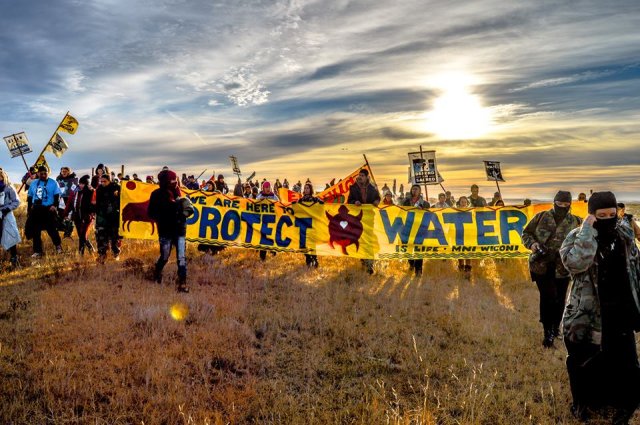
After months of fierce opposition from Native Americans and environmentalists, the controversial Dakota Access pipeline (DAPL) is finally carrying oil under Lake Oahe in North and South Dakota, as preparations are made to bring the project into full service.
Owned by Energy Transfer Partners, the 1886 kilometre-long pipeline threatens water supplies and sacred sites on the Standing Rock Indian Reservation, and violates multiple treaties signed with First Nations tribes. When fully operational, the US$3.78 billion dollar project will shift half-a-million barrels of oil a day across four states, ending in Illinois.
“Oil has been placed in the Dakota Access Pipeline underneath Lake Oahe,” Energy Transfer Partners said in a court filing in Washington, DC on March 27. “Dakota Access is currently commissioning the full pipeline and is preparing to place the pipeline into service.”
Earlier last month, a federal court denied a request from the Cheyenne River Sioux tribe to prevent oil from flowing through a section of the pipeline close to the tribe's reservation.
“The fact that oil is flowing under our life-giving waters is a blow, but it hasn’t broken us,” Cheyenne River Sioux Tribal Chairman Harold Frazier said in a statement. “Our legal fight is very much alive and we believe that ultimately we will prevail.”
After months of protesting against the pipeline, including occupying lands and direct action to stop construction, the Army Corps of Engineers said that the pipeline would not be allowed to cross under Lake Oahe. However, one of Donald Trump’s first executive orders was to reverse this decision by the Barack Obama administration.
As part of the status update in the ongoing lawsuit, the company did not say when the pipeline would be ready to carry oil to its shipping locations. While the project is almost complete, it has been delayed by the ongoing protests.
Native American tribes and environmentalist argue that the pipeline violates tribal sovereignty, is being built across sacred lands, and that a spill could be disastrous for the local ecosystems, especially the Missouri River, the main water source for many tribes.
The filling of oil represents one of the last hurdles for the pipeline’s completion, but opponents have vowed to continue their fight against the project.
[Reprinted from TeleSUR English.]
Like the article? Subscribe to Green Left now! You can also like us on Facebook and follow us on Twitter.